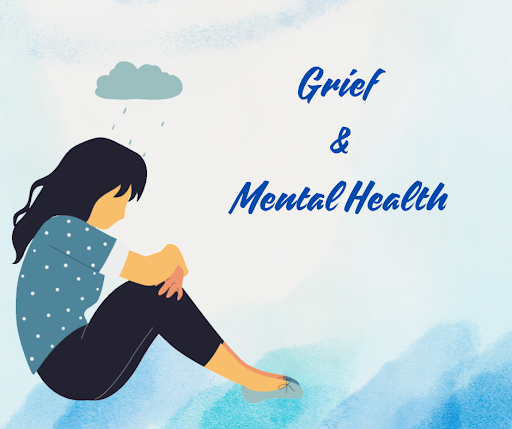As May is mental health month, we wanted to discuss widows and mental health. We knew about grief as we each had attended funerals of loved ones, such as grandparents and others. When we each lost our husbands, we understood that there would be grief, and we braced ourselves for what we thought would happen. However, even though we had experienced loss before, we truly did not understand the earth-shattering grief of losing a spouse. We knew there would be sadness, tears, and a deep sense of missing the person we loved most in the world.
But what we didn’t expect was the enormity of the different feelings and swirling emotions. The widow waves, and the extreme emotions that stopped us in our tracks. There was exhaustion, panic, anxiety, fear, and numbness. The moments of forgetfulness were sometimes so strong that we couldn’t remember why we walked into a room or remember to pay the bills. We didn’t expect to feel disconnected from the people around us, or to suddenly not recognize the person staring back in the mirror. This loss had changed our lives so completely, and putting the pieces back together was much more difficult than any of our previous grief experiences.
Grief is complex. And in widowhood, it’s rarely just about feeling sad. It’s about losing your sense of safety, your routine, your role in the world. Wondering if you’re losing your mind in grief. It’s about waking up in a reality you never asked for—one that affects not just your heart, but your mind and body too.
We both had days when we felt like we were lost or “doing it wrong.” One of us remembers walking down the hallway at work and being paralyzed by the idea of seeing someone who might ask, “How are you?” when the only honest answer would have been, ”I don’t know or I’m doing awful”. The other remembers the exhaustion that came from trying to get up every day and just trying to be there for her children. It was simply exhausting to keep up the pretense of being “okay.”
Looking back now, we realize these weren’t just moments of grief—they were mental health moments. We were navigating anxiety, depression, and trauma responses, without anyone really naming it that way. We both lost our husbands suddenly, and that adds a level of trauma no one talks about.
There were times when each of us thought, “Am I going crazy?” The truth is that we were not. Grief was just reshaping our reality. A reality that we now had to redefine. As a result, our emotional baselines had shifted. The feelings were more intense than we’d ever experienced. Our brains and bodies were reacting to trauma. And that didn’t make us weak. It made us human.
In Western culture, widows are often praised for being “strong.” We didn’t want to be strong; we wanted our person back. We had to be strong; there wasn’t a choice as we both had children to care for and work to show up to. We understand that the sentiment of being strong comes from a place of care or love, but sometimes it can be isolating. Strength doesn’t mean suppressing emotions. It doesn’t mean pretending we’re fine or avoiding the messy, honest parts of our healing. True strength has looked different for both of us—sometimes it’s been asking for help, going to the doctor or therapist. Sometimes it’s been letting ourselves cry, nap, take time off work, not show up to events, cancel plans, or go to therapy.
We’ve learned that grief and mental health are deeply intertwined. And just like grief, mental health challenges don’t follow a straight path. Some days, we felt empowered. Other days, we felt like we were back at the beginning. There were many days in the middle with some parts doing well and functioning, and others barely hanging on. That’s okay and normal. No matter your feelings and your process, know that this is your journey, and it will be unique to you.
This Mental Health Awareness Month, we want to shine a light on the whole picture of widowhood— the mental health aspect and the parts people don’t always see. No one saw us crying ourselves to sleep, slipping into the bathroom to have a moment, lying on the ground in the snow at the gravesite, or pulling the car over to dry heave, and so much more.
If you’re grieving and struggling to concentrate, to sleep, to feel like yourself, you’re not broken. You’re not “doing widowhood wrong.” You’re navigating one of the most profound life changes a person can experience, and it’s okay to need support.
Whether you feel heartbroken, angry, guilty, disconnected, or simply flat—your experience is real and valid. There’s no right way to grieve. And there’s no shame in needing support. In fact, getting support is part of the process.
If you’re reading this and quietly nodding, we want you to know that you are not alone. We see you. We’ve been you. And while your story is uniquely yours, we hope ours reminds you that it’s okay to feel everything—and to ask for what you need.
You don’t have to pretend you’re okay. You don’t have to carry this weight alone.
Let’s keep this conversation going
Have you experienced grief in ways that affected your mental health? What helped you begin to heal? Leave a comment or share this post. Someone else might need to know they’re not the only one feeling this way.
Peace & Blessings,
Teresa & Jeni
PS: For additional support, you can download our free copy of 10 Ways to Move Forward After Loss
The First Days: Coping with Life After Loss is a resource for the first days after a loss – available on Amazon in paperback.
My Journey as a Widow: A Widow’s First Journal is a follow-up journal for processing complex emotions and moving forward with hope. It is available in paperback on Amazon.
Follow us on Social Media:
Facebook: https://www.facebook.com/TornInHalfwidows/
LinkedIn: https://www.linkedin.com/company/torn-in-half/




